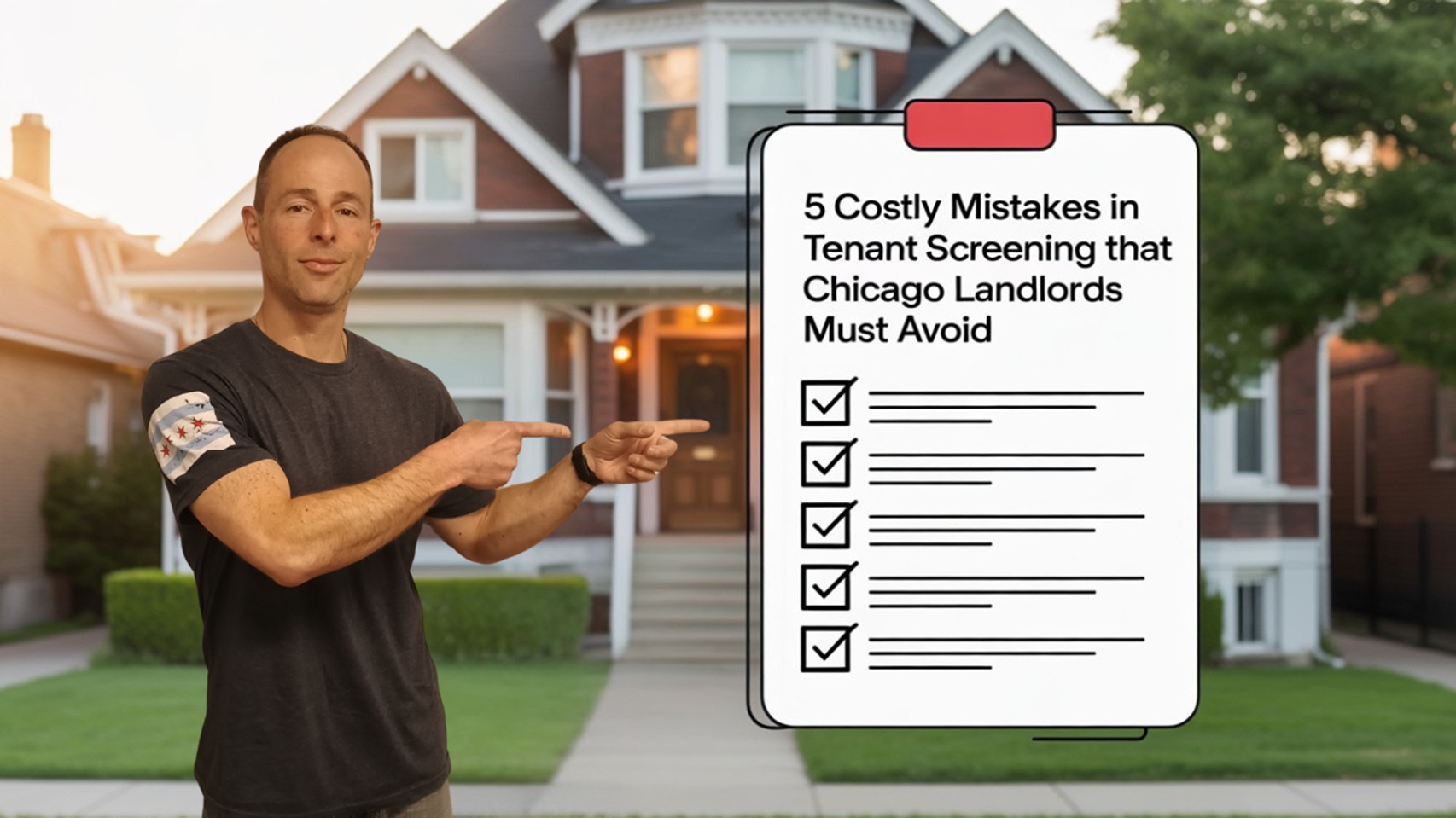
Author: Mark Ainely | Partner GC Realty & Development & Co-Host Straight Up Chicago Investor Podcast
Tenant screening isn’t the sexiest part of being a landlord. Nobody buys their first two-flat in Avondale thinking, “I can’t wait to run background checks.” But here’s the truth: screening is where you either make or lose money.
It is also where you set yourself up for easier management. As a Property Management company owner, I learned over 20 years ago that if put 80% effort into marketing and screening, the day-to-day management becomes incrementally easier.
It’s not the paint color, the countertops, or even the location. Your success as a Chicago landlord is often determined long before the first rent check shows up.
I’ve seen landlords in Chicago lose $10,000 on a single bad tenant. I’ve also seen smart investors who follow a strict process enjoy years of consistent rent, respectful tenants, and experience ease of management. The difference? Screening.
Screening everywhere in this world is the difference between things working or not:
As I write this, I am on a plane, and they do their best to screen any passengers who may pose a threat.
They screen minors from entering a bar.
They screen just anyone from walking into a school these days.
Everywhere you turn, there are systems in place to screen or keep the good ones in and the bad ones out.
Lack of screening systems or broken screening systems will allow bad characters to get through. Enter the problem tenant!
Most landlords don’t fail because they bought the wrong property. They fail because they let the wrong person inside it. And once that tenant is in, you’re no longer in control. The law, and the lease, gives them a lot of rights. That’s why you need to get this part right from the start.
A housing provider in the Chicago market has the most leverage before they turn keys over. Use your leverage wisely.
After placing thousands of tenants and talking with thousands of investors across Chicago and the suburbs, I can tell you five mistakes that cost landlords the most money. If you avoid these, you’ll be miles ahead of the competition.
1. Skipping a Full Background Check
You’d be shocked at how many landlords rent their two-flat in Avondale or single-family in Berwyn without pulling a background check.
A Google search is not a background check!!
Maybe the tenant showed up on time, dressed nicely, and said all the right things. But a smooth handshake doesn’t pay the rent in month 4.
Here’s what a full check means in Chicago:
Credit report: If you’re renting in Logan Square where average rents hover near $2,200, you want proof that your tenant manages money well enough to cover it. (Check out 2025 law on accepting credit reports from applicants)
Eviction history: I once saw a landlord in Uptown rent to someone who had four prior evictions. Within six months, they were back in court. It’s public record, don’t ignore it.
Employment & income: A tenant renting a $1,500 unit in Cicero should have at least $4,500 in stable income. That is net and not gross. It is important to run your income requirement as a net number.
Criminal background: This isn’t just about your property; it’s about neighbors and the community. If you are in Cook County, make sure you understand Just Housing Amendment and what you can and can’t do.
I see landlords run a modified version of these reports, depend on google, or run just local checks vs nationwide reports. People do crazy things in other states and run from it to your property so know where they have been.
2. Falling for Fake or Fraudulent Applications
Fraud is running wild in Chicago right now. I’ve seen fake pay stubs printed at FedEx Kinko’s in Rogers Park, doctored bank statements in South Shore, and tenants using borrowed identities in Little Village.
These problems happen everywhere.
Common red flags I see in the Chicago market from tenants:
Pay stubs that don’t match deposits. In Logan Square, a young professional might show a stub for $4,000 a month, but the bank account only shows $800 deposits. Or the math on the pay stub doesn’t add up. Payroll providers do not have mathematical errors.
Phony landlord references. In Bronzeville, a tenant listed their cousin as a landlord. A quick check on property records showed the cousin never owned the building.
Pressure to sign. A scammer in Albany Park once begged a landlord to skip screening because they “needed to move in tomorrow.”
Staying with a friend. How many grown adults do you know lice with family or friends? Might be true, but understand why.
Your job is to look for red flags and go deep. A red flag could be a legitimate story but go deep till you uncover a proven story behind the red flag that makes sense and lines up with the rest of the application.
3. Not Calling Previous Landlords
This mistake shows up everywhere from suburban Des Plaines to city neighborhoods like Bronzeville. A credit report won’t tell you if the tenant constantly argued with neighbors or left trash in the hallways. Only a previous landlord can.
Heck, you should call the last two landlords like we do here at GC Realty. The current landlord might want them out but two landlords ago have nothing to lose and may take the opportunity of your call to vent some feelings about their time with your applicant.
l always say you can’t screen for crazy but the previous landlord(s) will tell you.
When I call, here’s what I ask:
Did they pay on time?
Did they put more or fewer work orders in than your best tenant you have ever had?
Would you rent to them again?
Would you let a family member rent to them?
And here’s the kicker: fake references are common. I’ve had tenants in Pilsen give me a “landlord” number that turned out to be their friend’s cell phone. One quick check on Cook County property records exposed the lie.
If I am ever suspicious that it isn’t the person they say it is I ask a question with bad info. Example:
If I know the tenant was with this landlord 1 year, I would ask the question “Can you confirm the applicant was with you for just over 4 years?”
Do the extra step. Match who you are calling with property records to verify they really do own the property before trusting the reference.
4. Rushing to Fill a Vacancy
Vacancy feels like money burning. I get it. Whether it’s a condo in Streeterville or a bungalow in Jefferson Park, every empty month hurts. But a bad tenant costs more than vacancy ever will.
Here’s a story: a landlord in Humboldt Park rushed to fill a unit. He didn’t rush at first but the process of on going inquiries, showings multiple times per week, and trying to underwrite multiple applications made him want to just be done with the process. So he went lax on his requirements. The tenant looked fine on paper but was barely over the income threshold and he had a bad feeling in his stomach. But what did this Landlord do? He didn’t dig more into the red flags or bad gut feeling and let him move in. Within three months, rent stopped. The eviction dragged on for nearly a year. That landlord lost far more than if they had waited for a stronger applicant.
A wise man once told me, "Don’t step over dollars to pick up pennies."
How to avoid the trap:
Pre-screen on the phone. Don’t waste time showing units to unqualified renters.
Stick to your rules. If you want 3x rent in income, don’t settle for 2.5x because “they seem nice.”
Don’t panic. A couple of weeks of vacancy is far cheaper than an eviction in Cook County court.
Landlords in places like Logan Square or Wicker Park often rent fast because demand is high. But even in slower markets like Des Plaines or Calumet City, patience is still cheaper than desperation.
5. Ignoring Chicago’s Tenant-Friendly Laws
This is where many landlords get burned. Chicago’s RLTO (Residential Landlord and Tenant Ordinance) or Cook County’s RTLO(Residential Tenant and Landlord Ordinance)is not optional. One mistake and you could be writing a check to your tenant’s attorney.
Some key points:
Application fees: Must be disclosed and reasonable. I’ve seen small landlords in Albany Park get sued for charging $125 application fees.
Source of income discrimination: In any neighborhood or suburb, refusing Section 8 is illegal. Tenants know this, and attorneys are ready to pounce. Learn more about Source of Income discrimination.
Security deposits: In Chicago, mishandling one security deposit can cost you $10,000 easily, so learn the pros and cons on security deposits vs non-refundable move-in fees. Most landlords in Chicago skip deposits altogether and go with non-refundable move-in fees instead. In Cook County, you know you can only collect a maximum of 1.5 times the monthly rent in security deposit, and you must allow a payment plan for the 0.5 portion if the tenant requests.
If you’re managing property in Mt Prospect, Oak Park, or Evanston, these cities have their own seperate tools outside of RTLO and RLTO.
The bottom line? Learn the law before you learn the hard way.
The Big Picture: Screening Lowers Risk & Gives Your piece of mind.
Whether you own a condo in Lincoln Park, a two-flat in Avondale, or a single-family home in Oak Lawn, the rules don’t change. Bad tenants cost money everywhere.
A bad tenant in Wrigleyville can trash your unit and hurt property value.
An eviction in Cicero can take nearly a year.
A fraudulent renter in Rogers Park can tie up your unit while you bleed rent.
On the flip side, a great tenant is worth gold. They’ll stay multiple years, protect your investment, and set you up for ease of day to day management.
That’s why screening isn’t just paperwork, it’s where the real money is made.
Tools for Chicago Landlords
Free Rent Analysis: Find out if you’re overpriced and chasing away good tenants, or underpriced and leaving money behind.
Tenant Placement Services: Let us market, show, and screen so you get the right tenant without the risk.
Chicago Landlord Resource Center: Learn about RLTO rules, screening strategies, and case studies from thousands of Chicago rentals.
Final Takeaway
Tenant screening is not paperwork, it’s protection of all that risk you have as a Landlord in Chicago. It’s the shield that keeps your Chicago investment safe and profitable. Skip steps, and you’ll pay for it. Do it right, and you’ll enjoy the kind of stability and returns that make landlording worth it.
So next time you’re tempted to take a shortcut, remember: every lease you sign is either a goldmine or a landmine. The choice is yours.
Download our free guide, Mastering Tenant Screening in 2025, and protect your rentals the right way.
Capitalize On Your Team
We’ve shared a lot of information here on investing in real estate locally in Chicagoland. If you live outside the area, it may seem overwhelming for those wanting to invest in the Chicago market. But we really just look at it as a team sport.
Who’s on your investing team? Do you even have a team? GC Realty & Development, LLC has a dedicated team of professionals willing to share decades of experience in all facets of real estate investment. We handle everything from brokerage, leasing, and property management. Whether you hire us or not, we’re happy to provide our resources and expertise.
What gets me up in the morning and keeps me going 12 hours a day is the ability to add value to local area investors in Chicago and beyond! Those who connect with me often hear me say that our goal is to bring value to everyone we come in contact with.
We hope that in return, they will one day hire us for our tenant placement or property management services, refer us to someone they know, or leave a review about our services. We would clearly love all three; however, we’re happy whenever we get the opportunity to help!
Reach out today!

Partner / Co-Host of Straight Up Chicago Investor Podcast

 Vendor Portal
Vendor Portal



